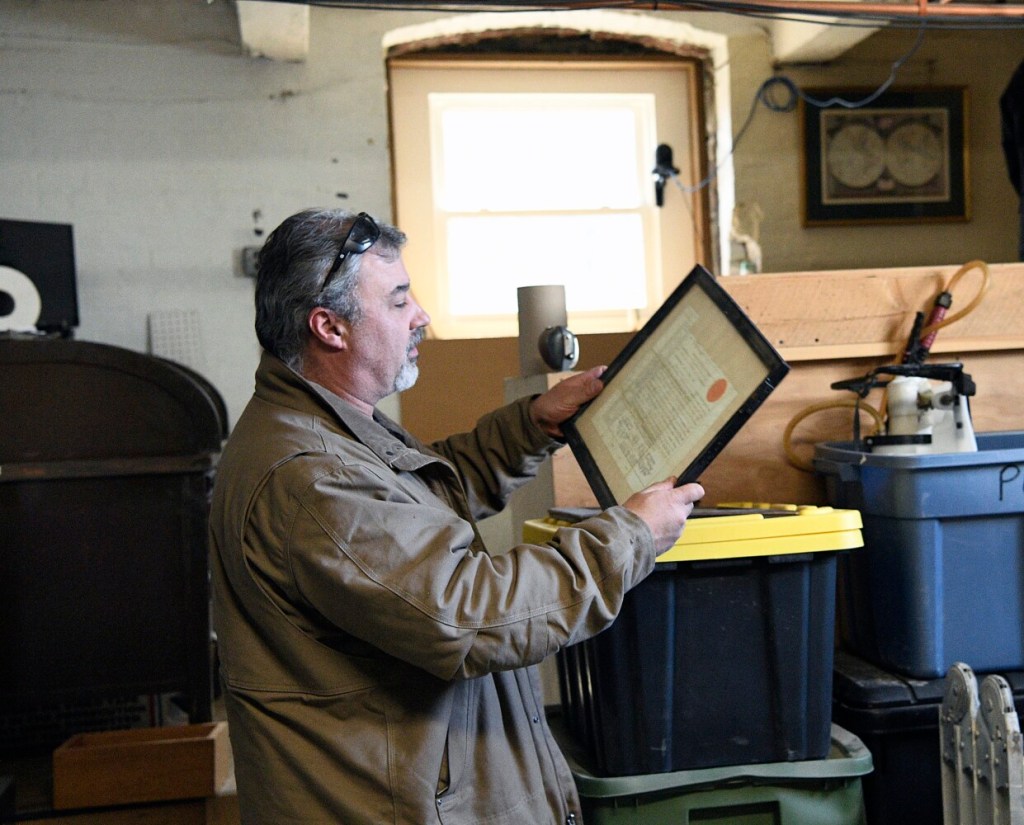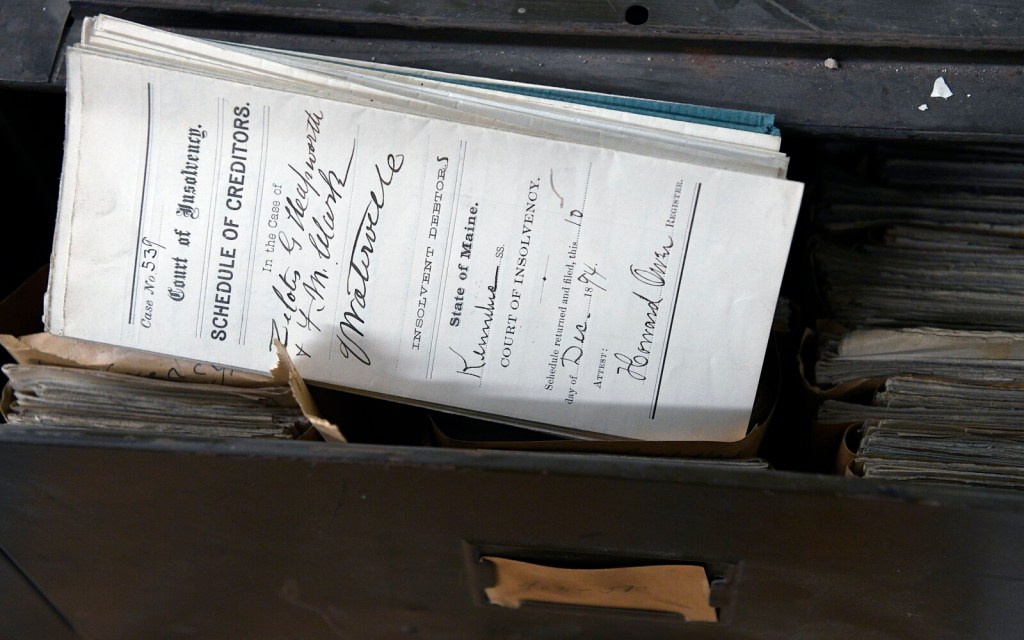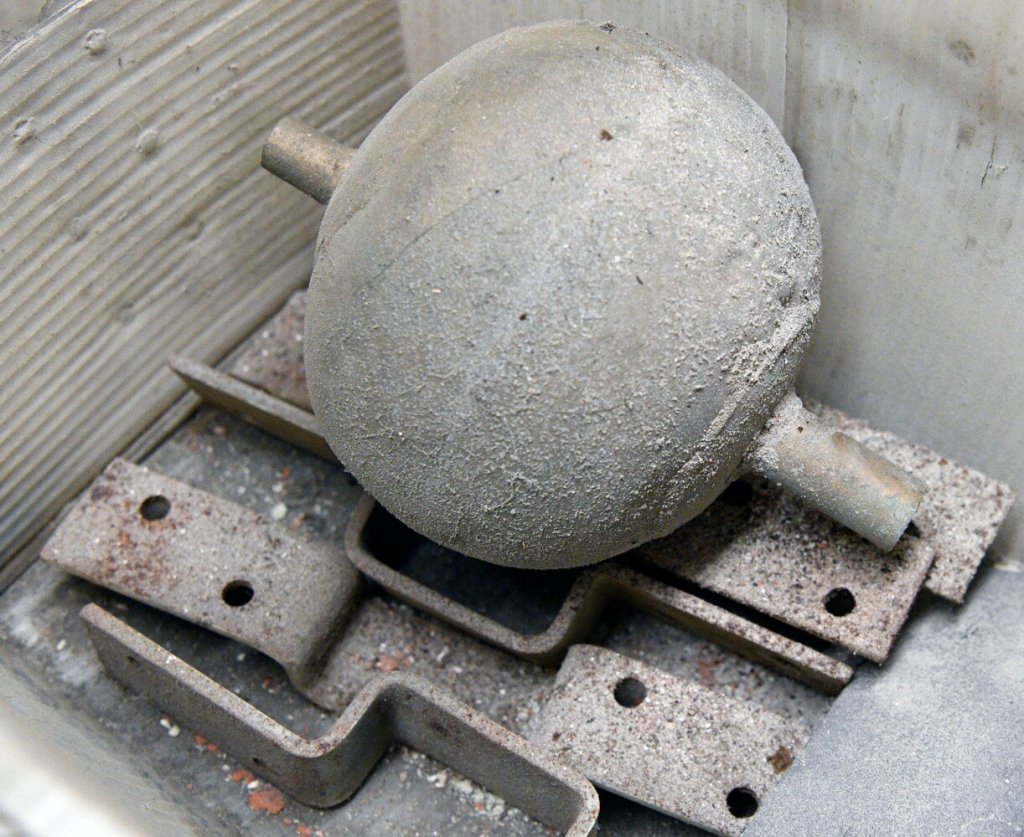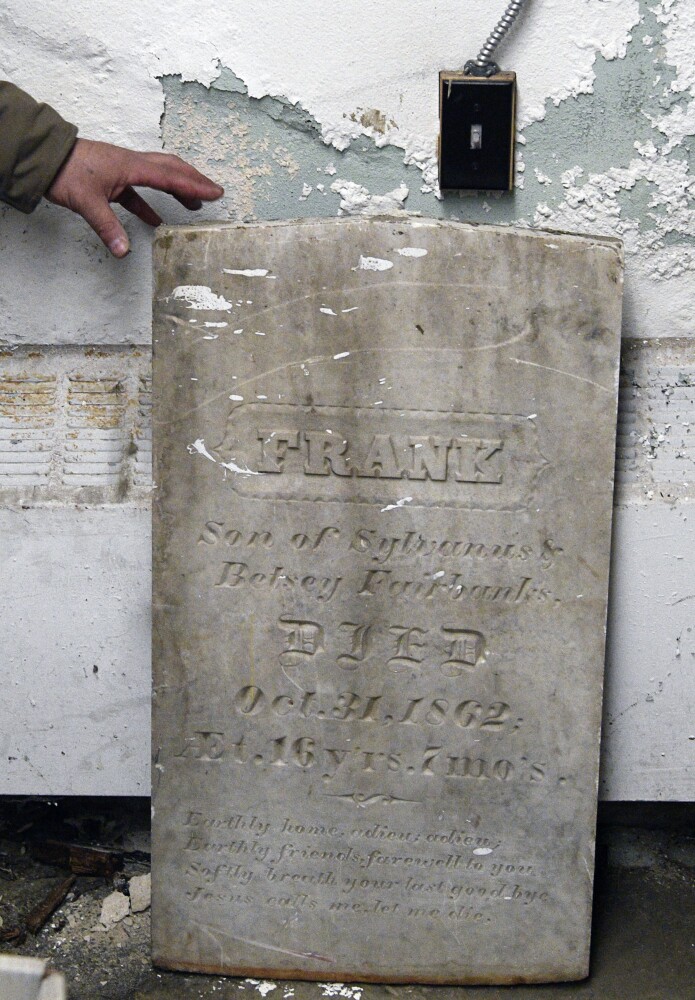AUGUSTA — For years — no one really knows how long — the story of Frank Fairbanks was lost.
But in March, when Dan Brunelle and a crew of workers from the Kennebec County jail started clearing out a storage room in the basement of the historic county courthouse, they uncovered it again.
The room, beyond the file storage area for the Kennebec County District Attorney’s Office, was apparently used to stash things no one knew what else to do with.
“Everything was rotted to the ground, soaking wet and just nasty,” Brunelle, facilities manager for Kennebec County, said. “It took us a better part of a week cleaning and shoveling it out. We filled three 12-foot dump trailers.”
Brunelle and other workers pulled out rusted scrap metal, rotting wood pallets, trash and tires from the room that apparently became a catchall for things that no one knew what to do with. Not everything was pitched. In the junk were parts from the weathervane that used to sit on top of the Kennebec County jail and some windows that don’t appear to belong in the courthouse.
As they were scraping up the mud at the far end of the room, the last thing they found was a stone slab.

The headstone of Frank Fairbanks, seen on Wednesday, was recovered in the basement of the former Kennebec County Courthouse in Augusta. Fairbanks was 16 years old when he died in the Kennebec County town of Rome in 1862. Andy Molloy/Kennebec Journal
“We found it there, face down,” Brunelle said last week, indicating the location on the floor. “When we picked it up, we were shocked it was a gravestone.”
The carved face of it, still in good shape, gave only the most basic details of the short life of Frank Fairbanks, who died in 1862 at the age of 16 years and 7 months.
It’s not clear why the headstone belonging to a teenage boy who died more than a century and a half ago ended up in the basement of the courthouse — was it evidence in a criminal case or did someone find it and bring it to the courthouse, not knowing what else to do with it?
The Kennebec County Courthouse’s basement is home to storage for the District Attorney’s Office, the Kennebec County Sheriff’s Office and the Kennebec County Probate Court. Years of files and stored evidence are secured in rooms or in vaults. Some are in the process of being digitized to preserve them so the paper copies can be discarded.
“We don’t have storage space, but what we have is inefficiently used,” he said.
Not long after Brunelle started working for the county in August, the Department of Labor conducted an inspection of county facilities, including the basement of the courthouse.
“It was almost embarrassing coming through (with the inspector) seeing all this stuff and getting judged for it,” he said.

Clearing out the rooms has been part of a larger scope of work on the lower level of the courthouse. Brunelle has been working with contractors to upgrade the electric system, and to mitigate the radon that’s been found in the basement.
The unexpected part of the job has been finding out where the headstone belonged, so he turned to the internet for help. He posted a photo on Facebook looking for leads. Findagrave.com, the online grave locating service, identified the Trask Cemetery, also referred to as the Trask-Yallaly Hill Cemetery, as Fairbanks’ final resting place in Rome, more than 20 miles away from Augusta.
He also found some help not far from where the stone was found.
Debbie Ann Currier, a clerk with Kennebec County Probate Court, has an office in the courthouse basement, where she does genealogy work with county records that date back to when Kennebec County was first incorporated in 1799.
Using the names of Frank’s parents that are also on the headstone, Currier was able to find information about the family including wills for both parents.
“What got me with this one, is I found the names, and it said Mount Vernon. Why was he buried in Rome?” Currier said.

Probate records clerk Debbie Ann Currier searches archives Wednesday in the basement of the former Kennebec County Courthouse in Augusta. Records there date back to 1792. Andy Molloy/Kennebec Journal
It became clearer when she extended the search to Ancestry.com, the genealogical website, but she didn’t find much on Frank, who was one of nine children of Sylvanus and Betsey Fairbanks. Six of those children survived to adulthood. Two sisters, one born in 1848 and the other born in 1852, both named Albina, both died in infancy.
According to his father’s obituary, Frank had enlisted as a soldier in Company K of the 24th Maine Regiment and died Oct. 31, 1862, in Rome. It’s not clear whether he left Maine to serve in the Civil War.
Brunelle said the headstone has no holes in its base for it to be set on pins, but it does have a discolored section along the bottom that indicates that it’s probably been in direct contact with the ground.
When he contacted Rome officials, he said they could not initially locate Fairbanks’ grave in the Trask Cemetery. But since his initial contact, the gravesite has been located and the town’s sexton is expected to pick up the headstone next week, have the stone repaired and cleaned and returned to where it belongs.
Send questions/comments to the editors.







Success. Please wait for the page to reload. If the page does not reload within 5 seconds, please refresh the page.
Enter your email and password to access comments.
Hi, to comment on stories you must . This profile is in addition to your subscription and website login.
Already have a commenting profile? .
Invalid username/password.
Please check your email to confirm and complete your registration.
Only subscribers are eligible to post comments. Please subscribe or login first for digital access. Here’s why.
Use the form below to reset your password. When you've submitted your account email, we will send an email with a reset code.